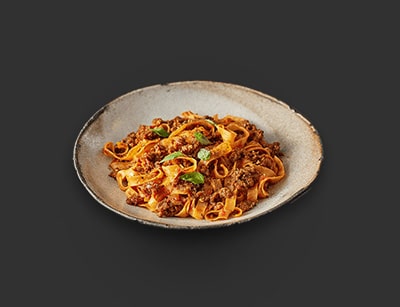
VEGAN STATISTICS – What is the Status in 2021?
There are an estimated 79 million vegans in the world. Sounds like a lot of people, right? Bear in mind that there’s 7.8 billion people in the world altogether, and suddenly the number of vegans sounds less striking in comparison. However, a vegan lifestyle has never been more mainstream than now. It started primarily as a way to exclude animal cruelty, but has recently been propelled by other causes such as health, sustainability and the current climate change crisis we’re facing too.
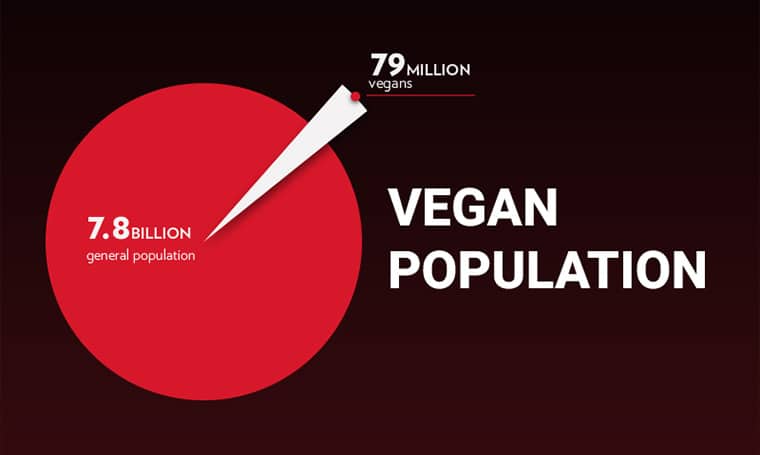
Animal welfare is still at the forefront of the vegan movement, though. Studies suggest that around 68.1% of vegans are motivated by animals, closely followed by their health at 17.4%. The environment lags behind at 9.7%, despite the meat and dairy industry being one of the main contributors to global greenhouse gas emissions, to name one environmental threat of many.
With veganism’s rise in recent years, the value of the vegan food market has also shot up. In 2018 it was valued at $14.2 billion, and is expected to rise to a staggering $31.4 billion by 2026. As for the vegan beauty products industry, it’s currently worth $15.1 billion and is predicted to exceed $21 billion by 2027. As we can see in the below graph, the interest of the word “veganism” on Google Search is growing in popularity (1-100) more and more every year.
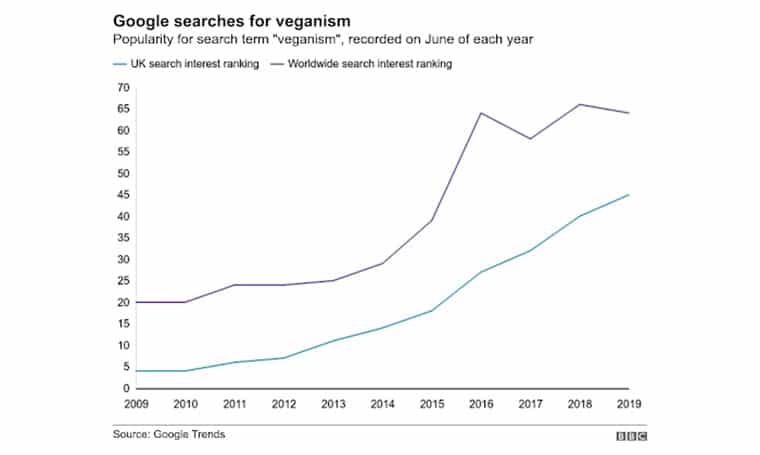
Vegan Statistics
There’s lots of information out there about veganism, but most are opinions and not actual data.. Let us help you sift through the overwhelming mass of vegan statistics and make it a little less overwhelming.
General Statistics
- Currently (September 2021), there are an estimated 79 million vegans globally, which is just over one percent of the whole population.
- In the US, two percent of people identify as vegan. Three quarters of them are female.
- By 2040, it’s projected that only forty percent of the world’s population will eat meat.
- The vegan food market value was $14.2 billion in 2018 and is projected to hit $31.4 billion by 2026.
- In 2020, vegan food sales grew twice as fast as general food sales.
- Plant-based meat comprises two percent of all packaged-meat options.
- There are over 53,000 products registered with The Vegan Society. Interestingly, more of those products are cosmetics than food.
- London, New York City, Berlin, Los Angeles and Toronto are widely considered to be the top five vegan cities in the world in terms of access to vegan food.
- London alone has over 200 vegan restaurants.
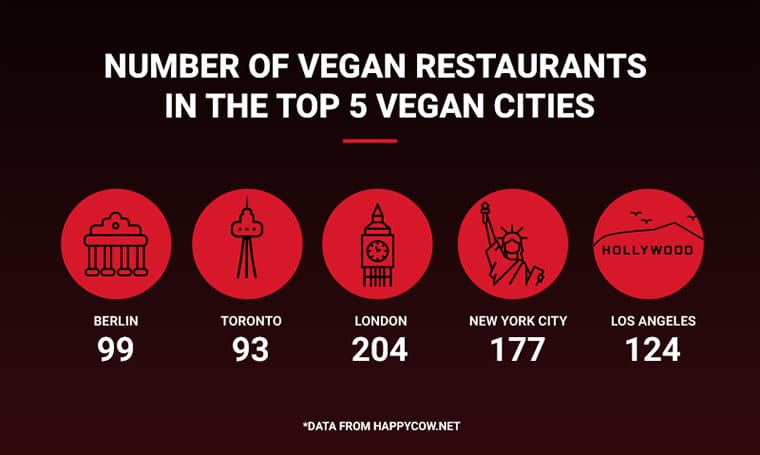
Is Being Vegan Better for the Environment?
We’re facing a climate change emergency around the world. Action needs to be taken to save the environment, and being vegan is often championed as a prime solution. How much is this backed up by data? Quite a lot actually.
The meat and dairy industry is responsible for around 15% of global greenhouse gas emissions, a leading cause of climate change. If the world went vegan, it could reduce greenhouse gas emissions from agriculture by two-thirds and avoid $1.5 trillion of climate damages. That’s a significant step towards saving the planet.
Aside from the above, perhaps it’s more tangible to focus on the sustainability aspect of being vegan. If the world continues consuming meat and animal products at the rate it does, there may not be enough food left to feed our growing population by as early as 2050. The meat industry is categorically unsustainable, so cutting it out altogether helps make the world a more sustainable place.

Is Being Vegan Better for Your Health?
Generally speaking, a lot more research needs to be done to give a definitive answer here. While a vegan lifestyle is commonly associated with better health, there’s no way of proving that a primarily plant-based diet with the occasional animal product is any worse for your health than a fully plant-based diet. However, what studies show so far is:
- The vegan diet is considered to be higher in fibre and lower in cholesterol than an omnivorous diet.
- A recent study of 48,000 adults found that people with vegan and vegetarian diets have a 1% lower risk of heart disease, but a 0.3% higher risk of stroke linked to B12 deficiency.
- Diets high in red meat lead to an increased risk of cardiovascular disease and diabetes.
- A higher intake of plant-based foods was found to give people up to 32% less risk of cardiovascular disease.
Being vegan means you are reliant on fruits, vegetables and other nutrient-rich foods to compensate where animal products must be avoided. As such, many vegan diets benefit from being more fulfilled with fruit and vegetables than an omnivorous diet. However, this doesn’t mean a vegan diet is necessarily richer in nutrients. Some vital vitamins and minerals can be found more in animal products than plant-based products, such as B12, calcium and protein. A vegan diet can sometimes lack these essential nutrients, so must be supplemented.
Per pound of body weight, 0.36 grams of protein is needed. Adult females weigh 150lb on average, meaning they need around 54 grams of protein per day. By consuming a serving of almonds and a couple of alternative meat products, such as two REDEFINE MEAT™ burgers, in one day, you’re already halfway there.
Veganism and Animal Welfare
As previously highlighted, veganism as a movement began as a way of avoiding the exploitation and cruelty of animals. This is still a primary focus of veganism today. Since 1970, 26 years after The Vegan Society was founded, the collective weight of free living animals has reduced by 82%. Now, of all the cows and pigs in the world, only 4% are free living animals. For some people, those changing figures are not things they wish to contribute to.
The average American vegan is likely to save 27 pigs from being eaten in their lifetime. Isn’t that cool? Even cooler, if the whole world went vegan, we could save eight million human lives in just thirty years due to better food preservation, less natural disasters at the hands of global warming, and more. We’d all like to be a hero, right? This is as heroic as it gets.
Veganism By Country
In order, the countries with the most vegans are:
- UK
- Australia
- Israel
- Austria
- New Zealand
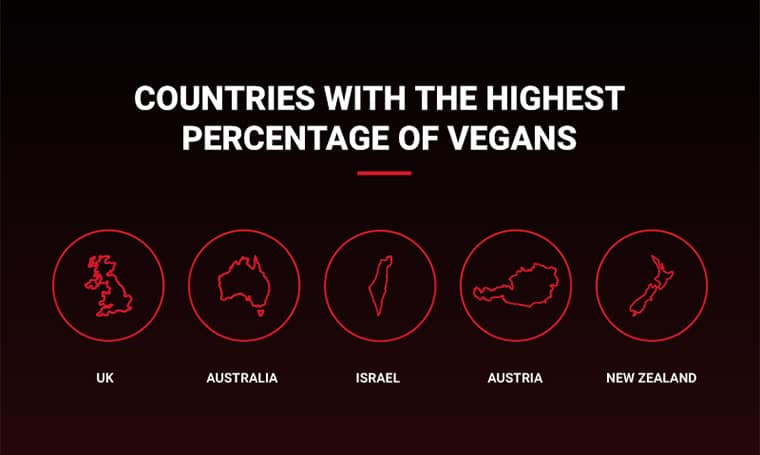
Five of the top vegan cities are in the UK alone. Despite the fact that Australia has one of the highest meat consumption rates in the world, it also boasts one of the highest vegan populations in the world. Over 5% of Israel’s population is vegan, that’s an impressive number. In Austria, 1.4% of the population are vegan, and it’s possible to enjoy a vegan schnitzel or two. Meat-free eating rose by 15% in New Zealand in 2019, a significant jump.

Why People Go Vegan: Vomad Study
In 2019, Vomad conducted a global survey with 12,814 participants from 97 different countries. Most participants were between the ages of 18-34 years old and came from Australia, UK, USA, Canada and New Zealand. As a global study, this provides good insight into veganism that isn’t biased to a single country’s culture or culinary habits. Here’s the statistics we found most interesting from their study:
- 68.1% of participants turned vegan for the animals.
- 17.4% of participants turned vegan for health reasons.
- 9.7% of participants turned vegan for the environment. Find out more about why eating meat is bad for the environment.
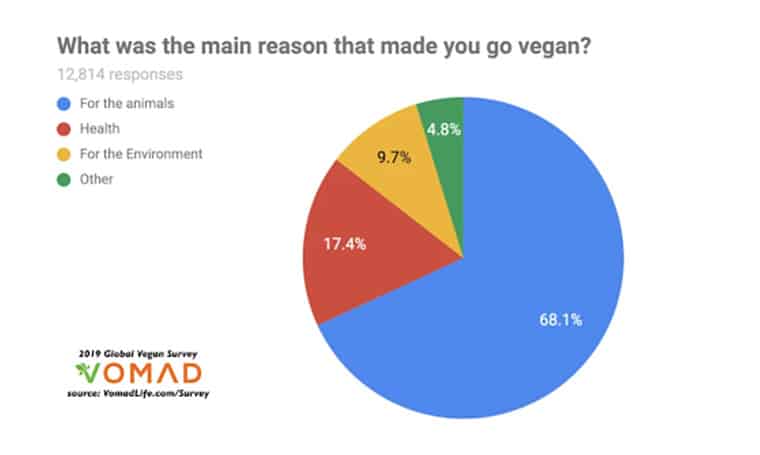
- 52.1% of participants were vegetarian before turning vegan.
- 43.3% of participants ate meat before turning vegan.
- Feature-length documentaries were the most influential means of inspiring the participants’ veganism.
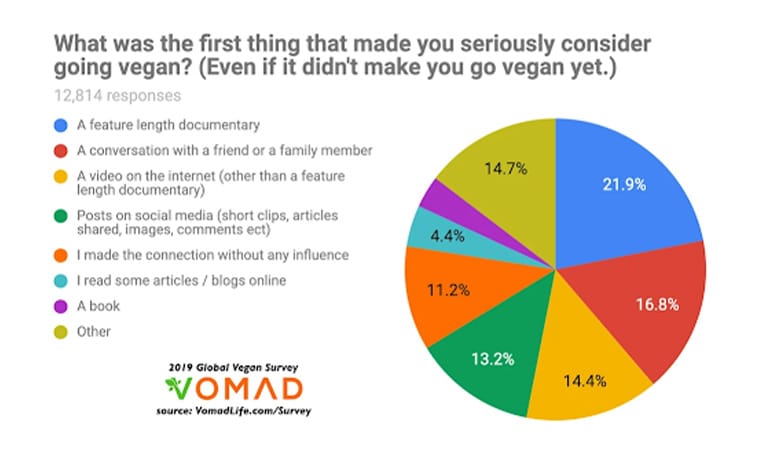
- What The Health (2017) was the most influential documentary in this regard.
- Gary Yourofsky had the most influential online video clips for turning people vegan.
- Veganuary was the most popular vegan challenge to influence people to become vegan.
It’s interesting to note how most vegans from the survey were motivated by animal welfare, and then their health, over the environment. It’s also insightful to learn that 52.1% of vegans from the survey did not cut out meat overnight, but first were vegetarian.
If you watch What The Health, you could be eating New-Meat™ burgers, sausages and more before you know it, and contributing to a more sustainable, animal and environmentally friendly world. You don’t even need to compromise on flavor or texture – Redefine Meat has spent years studying meat to ensure New-Meat™ is almost indistinguishable. Redefine Meat’s proprietary 3D printing technology takes plant-based ingredients and creates New-Meat™ that is both delicious and better for animals, health, and the environment.
FAQs
What percentage of the world is vegan?
Currently, less than one percent of the world’s population are vegan. It is estimated that 79 million people are vegan globally.
Is veganism growing in 2021?
Yes. It’s projected that the vegan food industry will hit $31.4 billion by 2026 as the vegan lifestyle grows in popularity. In the UK alone, the amount of vegans quadrupled between 2014 – 2019 and is only continuing to rise. Currently, every single UK supermarket has their own vegan range of food products. In fact, major UK supermarket Sainsburys predicts that by 2025, vegans and vegetarians will account for a quarter of the British consumer population. These trends can also be seen across the world, too.
What country is the most vegan?
There’s no definitive answer here. Israel is believed to have one of the highest percentage of vegans globally; it’s estimated that five to eight percent of the entire population is vegan. However, it has a relatively small population, so it is not the country with the most vegans in total. In the UK, over 600,000 people identify as vegan. For cultural and religious reasons (e.g. the cow is a sacred Hindu animal), India has more vegetarians than many of the world’s other countries combined.
What culture is the most vegan?
India has the lowest rate of meat consumption globally, according to the Food and Agriculture Organization (FAO). There are an estimated 400 million identifying vegetarians in India. Three of the most popular religions in India are Hinduism, Buddhism and Jainism. All three have a shared concept of displaying kindness and non-violence towards all living things. The cow is a sacred animal in Hinduism, so religious Hindus do not kill or eat them. That’s one explanation for why there are millions of cows roaming the streets of India, and you can even get stuck in a cow-caused traffic jam! In India, you can easily access vegan food, whether that’s a lentil dhal, vegetable or potato curry, or a delicious, deep fried street snack, from samosas to pakoras.


